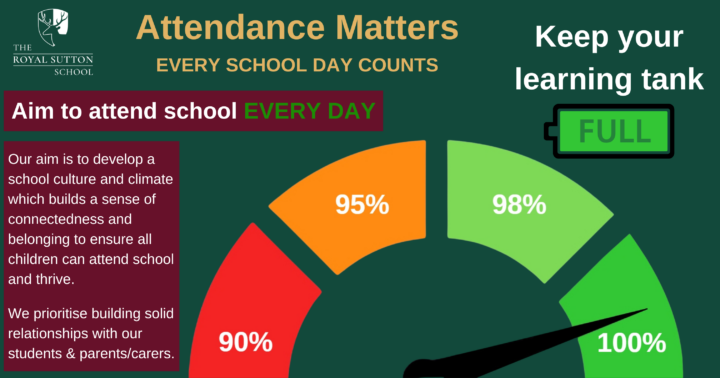Attendance
Why are attendance and punctuality so important?
Missing out on or being late to lessons leaves students vulnerable to falling behind. The Royal Sutton School seeks to ensure that every student receives a full-time education to maximise their opportunities and to realise their true potential both socially and academically.
Over a period of five school years, a student with 90% attendance will have missed half of a whole year of schooling. Similarly, students with poor punctuality miss valuable lesson time – which will jeopardise progress if it happens regularly.
School and future success starts with good attendance & punctuality

Achieving excellent attendance is essential to achieving success and as such, we work closely with parents or carers, students and staff to ensure this can be realised.

What do I do if my child is not well enough to come to school?
If you feel that your child isn’t well enough to come to school, you need to notify us before 8:30am on every morning of absence. You can login to the Studybugs app using your email address and follow the steps to report an absence.
Alternatively, you can email our Attendance Team at attendance@trss.bham.sch.uk or call them on 0121 378 6564. Please ensure that you clearly state your child’s name, tutor group and the reason for the absence. If we do not receive a reason for absence, we are required to record this as unauthorised absence.
Medical appointments should be made for after school wherever possible. We may ask to see evidence of medical appointments, if your child’s attendance is poor.
According to NHS guidance, children do not require time off for the following: Cold; Cold sores; Conjunctivitis; Cough; Hand, foot and mouth; Headache; Head lice; Sore throat; Threadworms; Tonsillitis; Warts and/or Verrucae. Click here for NHS guidance.
What does authorised and unauthorised absence mean?
We must follow national legal guidelines which means that holiday requests during term-time cannot be authorised. Because of this, unauthorised absences will likely incur a fixed penalty notice. These are issued by school and processed by the local authority.
We will not authorise a student’s leave of absence during term time, as this is only done in extremely exceptional circumstances. If you don’t get permission from the school, the absence is classed as ‘unauthorised’ and this includes lateness. If you want to see if an absence can be authorised, you must contact school in advance and get permission from the Headteacher via the attendance office.
What will happen if my child misses school?
We keep parents up to date with their child’s attendance and confirm absences with them; this makes sure students are supported in their progress at school.
Our Attendance Team work really hard to support students and often identify patterns of non-attendance. They will always work with parents and carers to understand these patterns and see how they can be improved.
If you are concerned about your child’s school attendance, it is always best to talk to us first. We have a dedicated Attendance Team who are here to help students and families.
Contact the Attendance Team: attendance@trss.bham.sch.uk or 0121 378 6564


